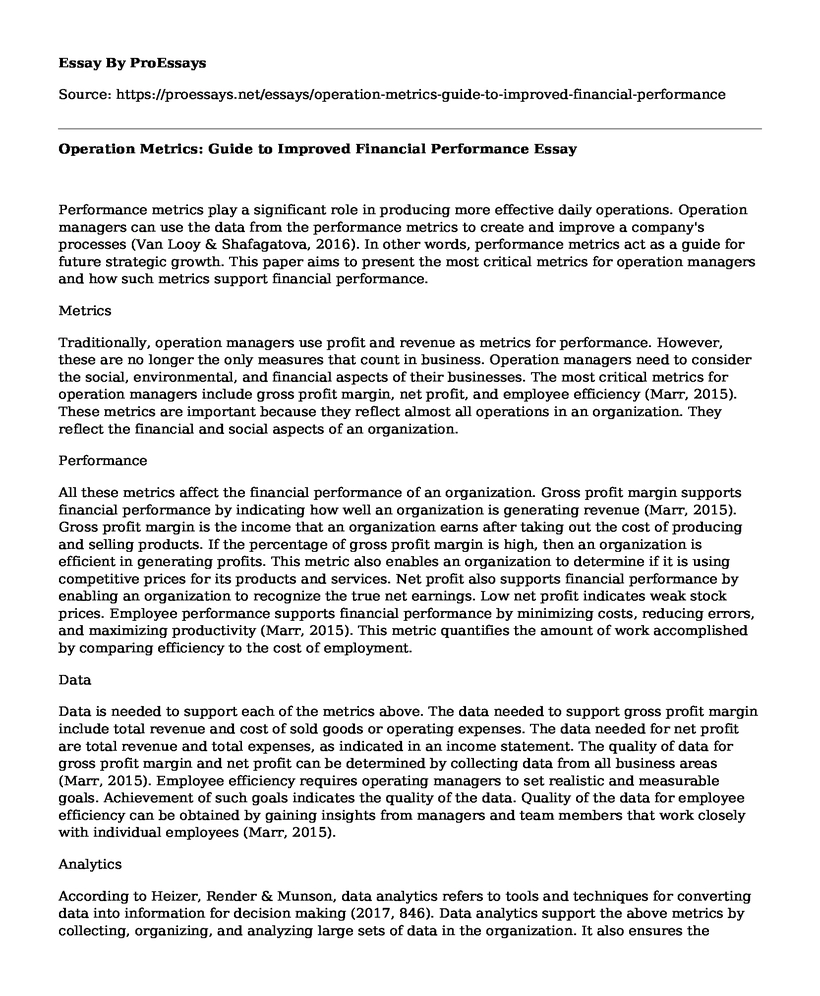Performance metrics play a significant role in producing more effective daily operations. Operation managers can use the data from the performance metrics to create and improve a company's processes (Van Looy & Shafagatova, 2016). In other words, performance metrics act as a guide for future strategic growth. This paper aims to present the most critical metrics for operation managers and how such metrics support financial performance.
Metrics
Traditionally, operation managers use profit and revenue as metrics for performance. However, these are no longer the only measures that count in business. Operation managers need to consider the social, environmental, and financial aspects of their businesses. The most critical metrics for operation managers include gross profit margin, net profit, and employee efficiency (Marr, 2015). These metrics are important because they reflect almost all operations in an organization. They reflect the financial and social aspects of an organization.
Performance
All these metrics affect the financial performance of an organization. Gross profit margin supports financial performance by indicating how well an organization is generating revenue (Marr, 2015). Gross profit margin is the income that an organization earns after taking out the cost of producing and selling products. If the percentage of gross profit margin is high, then an organization is efficient in generating profits. This metric also enables an organization to determine if it is using competitive prices for its products and services. Net profit also supports financial performance by enabling an organization to recognize the true net earnings. Low net profit indicates weak stock prices. Employee performance supports financial performance by minimizing costs, reducing errors, and maximizing productivity (Marr, 2015). This metric quantifies the amount of work accomplished by comparing efficiency to the cost of employment.
Data
Data is needed to support each of the metrics above. The data needed to support gross profit margin include total revenue and cost of sold goods or operating expenses. The data needed for net profit are total revenue and total expenses, as indicated in an income statement. The quality of data for gross profit margin and net profit can be determined by collecting data from all business areas (Marr, 2015). Employee efficiency requires operating managers to set realistic and measurable goals. Achievement of such goals indicates the quality of the data. Quality of the data for employee efficiency can be obtained by gaining insights from managers and team members that work closely with individual employees (Marr, 2015).
Analytics
According to Heizer, Render & Munson, data analytics refers to tools and techniques for converting data into information for decision making (2017, 846). Data analytics support the above metrics by collecting, organizing, and analyzing large sets of data in the organization. It also ensures the information presented by the metric is accurate. Big data analytics help in increasing the efficiency and accuracy of data used in different metrics. For instance, the qualitative nature of data for employee efficiency metric means that an organization collects a huge amount of data. Through descriptive analytics, such data will be characterized and summarized to facilitate understanding (Heizer, Render & Munson, 2017). Since metrics such as gross profit margin and net profit rely on past data (usually annually or quarterly), data analytic tools are essential for the generalization of such huge data.
References
Heizer, J., Render, B. & Munson (2017). Operations Management: Sustainability and Supply Chain Management, 13th Edition https://doi.org/10.4018/978-1-5225-2036-8
Marr, B. (2015). Big Data: Using SMART, big data, analytics, and metrics to make better decisions and improve performance. John Wiley & Sons. https://doi.org/10.1002/9781118919767.ch9
Van Looy, A., & Shafagatova, A. (2016). Business process performance measurement: a structured literature review of indicators, measures, and metrics. SpringerPlus, 5(1), 1797. https://doi.org/10.1186/s40064-016-3498-1
Cite this page
Operation Metrics: Guide to Improved Financial Performance. (2023, Jun 07). Retrieved from https://proessays.net/essays/operation-metrics-guide-to-improved-financial-performance
If you are the original author of this essay and no longer wish to have it published on the ProEssays website, please click below to request its removal:
- Video Games Addiction
- Incidents When I Have Experienced Language Barrier Essay
- Do Violent Video Games Make Kids Angry and Cruel? - Research Paper
- Essay Sample on Neolithic Society
- Essay Example on Make Your Own Balsa Glider - Fly High With Fun!
- Funding Requirements, Editorial Policies & Formatting Guidelines: A Comprehensive Guide
- Free Essay Example on Ghana: Unifying Cultural Legacy Across Generations







